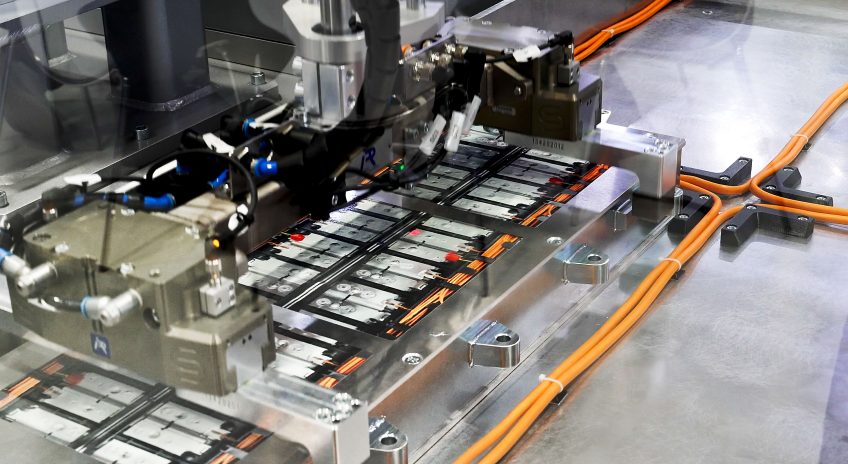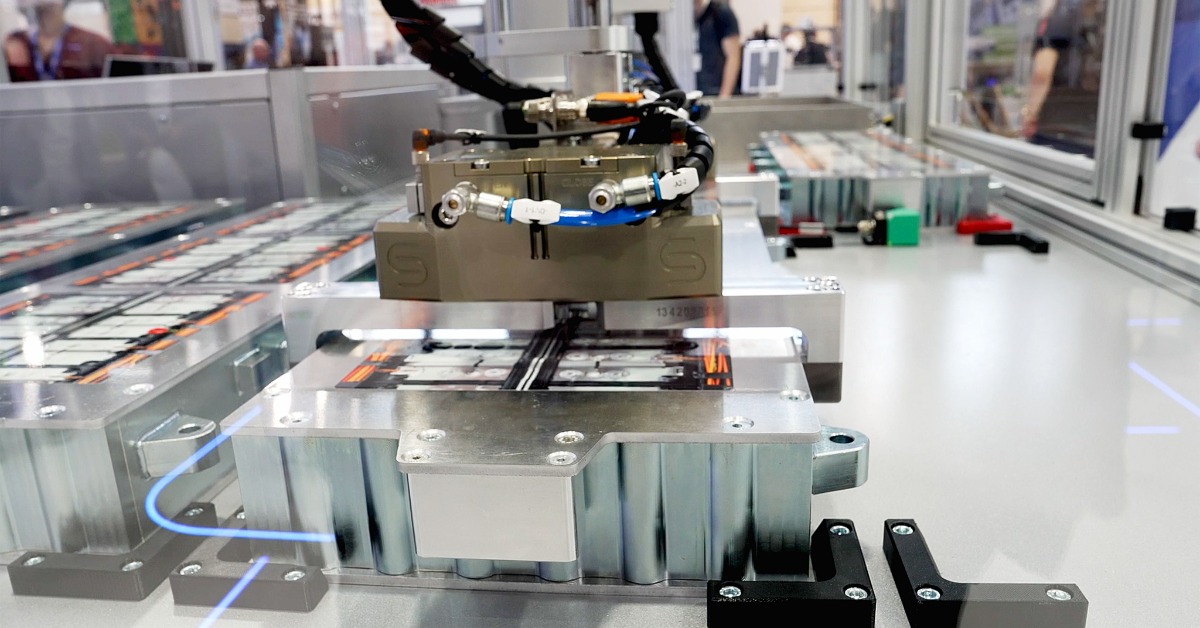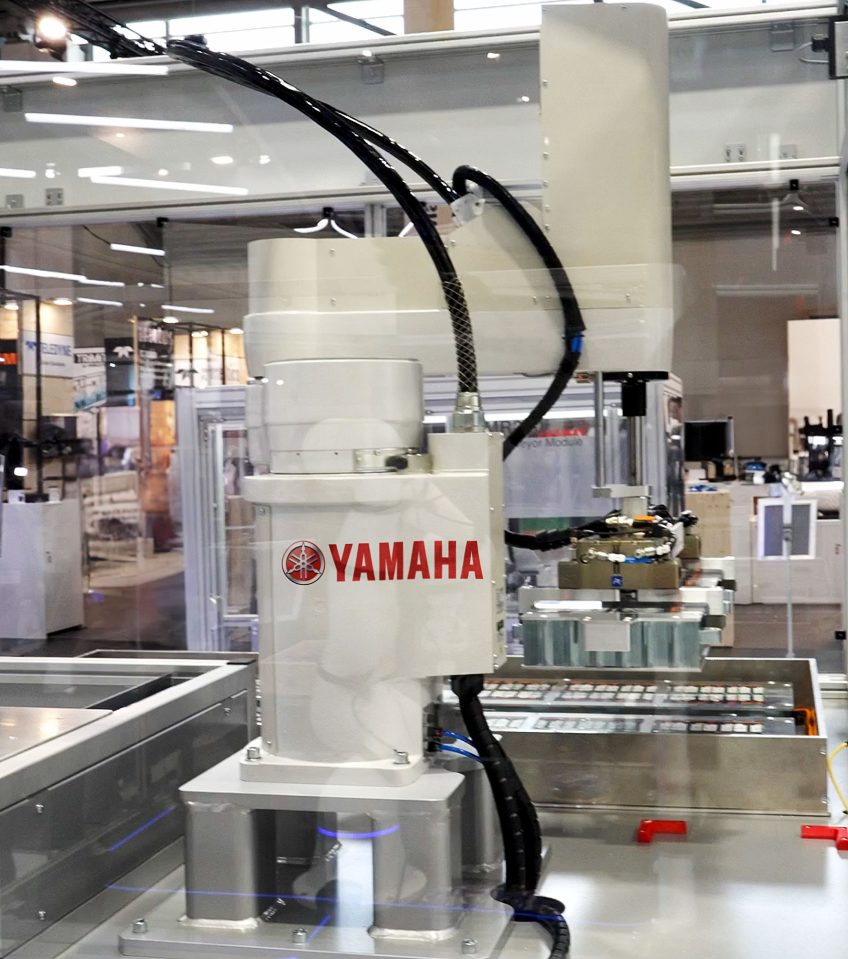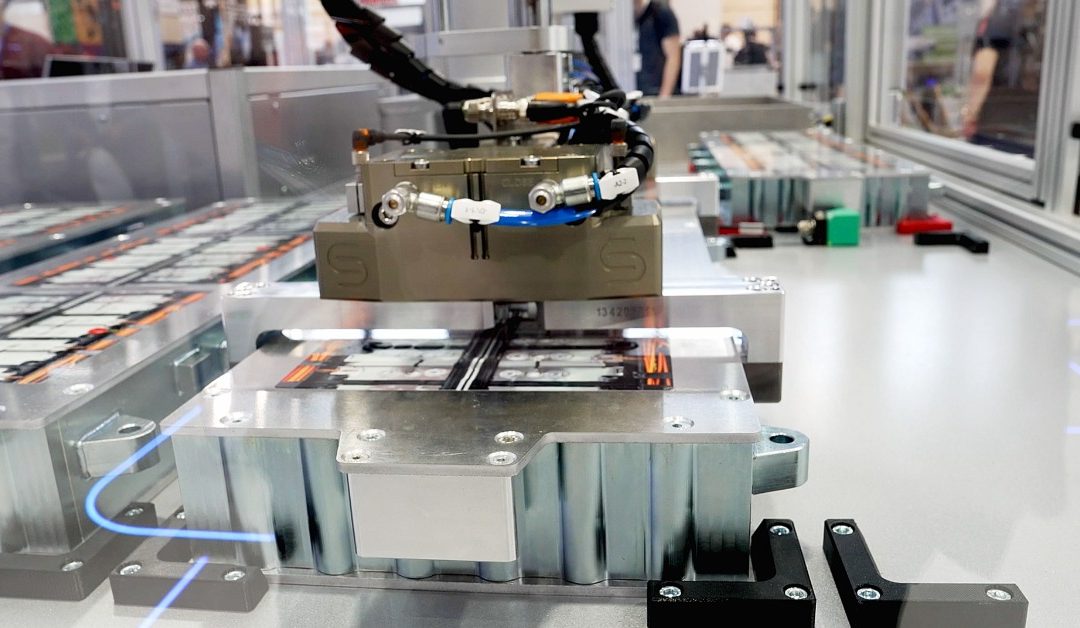SCARA robots contribute to efficient and flexible automation in battery production for cars, enabling precise and smooth movement of battery units for inspection and assembly purposes at the final stage of the production line.
The importance of electric vehicles in the market is growing, as evidenced by the introduction of new models with better usability and longer range. Due to environmental regulations, the market is moving towards a greater number of electric vehicles and demands more affordability. By increasing production and thus delivering more vehicles while being able to leverage economies of scale, car manufacturers can meet both requirements. Large-scale production is not new to the automotive industry. Currently, there is a need to create high-capacity and high-efficiency batteries exceeding 100 kWh for the growing electric vehicle market.
Quality, scale, and cost-effectiveness of yamaha robots
Emerging battery factories need to meet the growing demand for powerful batteries. This demand comes not only from the automotive sector but also from projects related to green technologies, such as grid energy storage. Complete automation of the production process is crucial for battery manufacturers’ goals, such as increasing production, leveraging economies of scale, and ensuring consistent quality. This is essential for achieving optimal battery performance, such as range, which has a significant impact on consumer perception. Battery safety is also a top priority.
These factories are spacious to accommodate the production of large energy storage systems. Autonomous vehicles, such as AGVs, are often used to transport heavy materials, while specialized robots handle specific processes such as ingredient preparation, cell assembly, and battery module creation. As cells are assembled into modules and these modules are integrated into larger sets, production processes often require precise placement of components in the right spots. This can be done manually or using automation.
As the assembly process progresses, the components become increasingly massive. A fully assembled prismatic battery module for electric cars can weigh between 30-40 kg. This presents a significant challenge for automation specialists, especially during the final stages of the production line, such as handling, testing, and packaging. Precise positioning of the module is crucial during final tests to ensure proper alignment of electrical connections. Equally important is the precise transfer of the module when connecting it to the main battery assembly. Ultimately, the pace of work is critical to ensure efficient production.

High-precision automation at a reasonable cost
The market offers SCARA robots known for their high performance and speed, while also providing precise positioning of up to 0.05 mm in the x-y plane and up to 20 µm in the z-axis. They address the need for efficient movement and placement of large battery components, such as lithium-ion cells. An example of such a robot is the Yamaha YK1200X, designed to carry loads up to 50 kg at a speed of 7.5 m/s in the x-y plane.
The Yamaha YK1200X model has been adapted to create HERO (Heavy Exact Rapid Operator), an innovative system for handling battery modules, designed to automate final testing and assembly processes. The presentation illustrates how the combination of Yamaha SCARA robots with dedicated technology allows efficient handling of 35 kg modules, increasing productivity.
Figure 1 depicts a dedicated lifting device designed specifically for the battery module. It interacts with four points on the housing, allowing secure lifting, transport, and rotation of the module up to 360 degrees, ensuring proper positioning. After successfully passing the tests, the modules are transferred from the test fixture to designated places in the battery pack, preparing them for final electrical connections and assembly.
The demand for automation solutions at the final stage of the production line can vary depending on the battery manufacturer, the battery pack design, and the type of vehicle. There is a need for precise placement of modules relative to the electrical terminals of the test equipment or during the final assembly process. Simultaneously, workers may be responsible for assembling electronic components such as the Battery Management System (BMS), installing wiring, connections, and ensuring the battery housing is sealed during the final stages of assembly. SCARA-based solutions can support each of these operations. Figure 2 illustrates how the YK1200X, equipped with a special handling head, places modules in the appropriate spots of the battery pack, facilitating manual or automated completion of electrical installation.

Optimization of production space
Using the long reach of the YK1200X, which has a 1.2-meter arm length, this solution demonstrates how any battery modules that do not pass electrical tests can be isolated from the battery production process and placed in a separate area for further examination and repair.
With greater reach, it is possible to effectively move modules to one of three designated areas for testing, assembly, or repair. The SCARA mechanism allows these actions to be performed in a space occupying no more than a few square meters. In large battery production plants, multiple such stations can be adapted, offering potential for further expansion and increased production efficiency. Figure 3 shows how the YK1200X model is mounted on a dedicated structure, highlighting the compactness of the end-of-line automation system.
Modern, advanced battery production facilities are key in the evolution towards electric mobility. Increased efficiency and productivity are fundamental for delivering an adequate number of EVs at prices accessible to a wide range of customers. Traditional automation solutions, such as proven SCARA robots, can be a cost-effective investment if they have the right parameters for handling final stages. Battery manufacturers can benefit from the efficiency and adaptability of available Yamaha industrial robots to transfer heavy battery modules with precision and speed.

SCARA robots offered by RENEX Group
At the RENEX Technology and Training Center, you can personally view and test YAMAHA brand devices and robots. RENEX Group, one of the leading companies in the Polish electronics sector and a distributor of YAMAHA Robotics for Poland and the Balkan region, aims to offer comprehensive services for the electronics sector. They not only provide equipment but also offer a wide range of consulting, service, and training services. Experts from the RENEX Technology and Training Center assist in identifying production challenges and suggest appropriate technological solutions.
The center organizes training on modern robotic technologies. Additionally, the AUTHORIZED YAMAHA TRAINING CENTER provides specialized knowledge about the operation and programming of industrial devices and robots, enabling clients to fully utilize their potential. The RENEX Technology and Training Center supports companies in adapting production processes, primarily targeting firms developing or implementing the production of electronic components and those looking to automate their processes using industrial robots. Additionally, the center offers advice on electrostatic discharge protection and maintaining EPA zones.
In the RENEX Group’s offer, besides comprehensive solutions, there is a rich range of service support—both during the warranty period and after its expiration. The services include consultations on optimal equipment use and preventive measures to minimize the risk of failure. It is worth noting that the RENEX Group’s Service Department was awarded by YAMAHA as the best European Service for YAMAHA Production Devices in 2020, confirming the world-class quality of their services.
